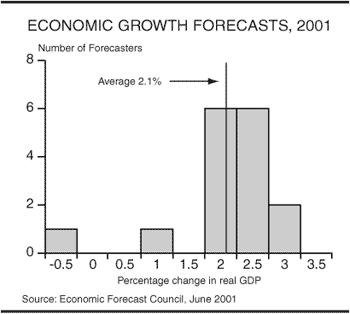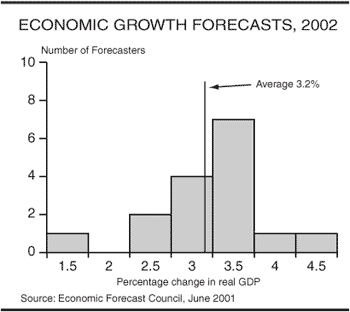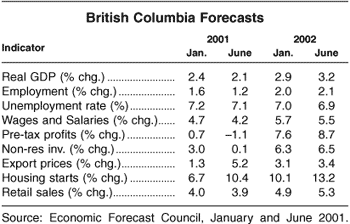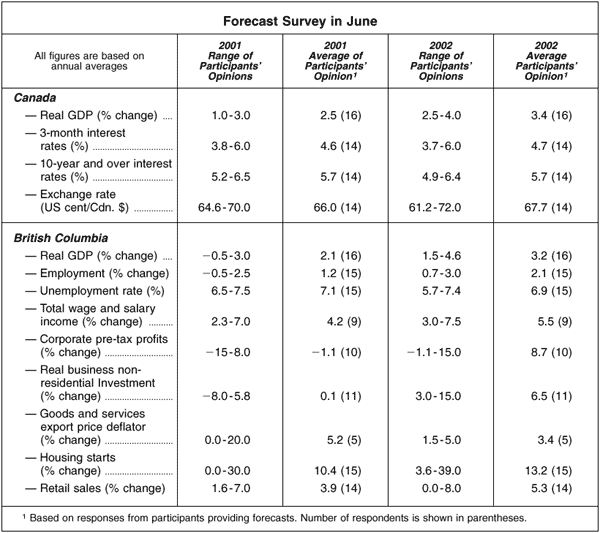|
THE
ECONOMIC FORECAST COUNCIL SURVEY, JUNE 2001
Background
The Minister of Finance is required by the Budget
Transparency and Accountability Act to seek the advice of the
Economic Forecast Council (the Council) on the outlook for the
provincial economy, and to present their forecasts at the same
time as the Estimates.
Since the January meeting of the Council there have been
several changes in both the external economic situation and in
fiscal policy in British Columbia. As a result, the Ministry of
Finance surveyed the Council members to obtain a revised forecast.
Revised Forecast Council Survey Results for 2001
The Council, on average, expected British Columbia’s economy
to grow 2.1 per cent in 2001 (see chart below). This was down from
the Council’s average forecast of 2.4 per cent in January,
consistent with a lower outlook for Canadian economic growth (from
2.9 per cent in January to 2.5 per cent in June).
The distribution of the forecasts also changed. In June, the
frequency was equally distributed in the range of 1.75 to 2.75 per
cent, whereas in January the forecasts were concentrated mainly in
the 2.25 to 3.25 per cent range.

Revised Forecast Council Survey Results for 2002
The average forecast of the Council for British Columbia’s
economic growth in 2002 was 3.2 per cent (see second chart), up
from 2.9 per cent forecast in January.
The distribution of the forecasts was concentrated in the range
of 2.75 to 3.75 per cent, while in January they were more evenly
distributed between the range of 2.25 to 3.75 per cent.
The Council’s forecast for Canadian economic growth in 2002
was upgraded from 2.9 per cent in January to 3.4 per cent.

Where are the Main Changes?
Some of the factors that contributed to the lower estimates of
provincial economic growth for 2001 included:
 |
Slower employment growth; employment growth
was revised down from 1.6 per cent in January to 1.2 per
cent in June. In addition, the Council provided a lower
forecast of wages and salaries, down from 4.7 per cent to
4.3 per cent growth. |
 |
A lower business investment profile — from
3.0 per cent growth to 0.1 per cent growth. |
 |
The forecast for housing starts in 2001 is up
from 6.7 per cent growth in January to 10.4 per cent growth
in June. Retail sales are down slightly from 4.0 per cent to
3.9 per cent growth. |

Many Council members expected the 25-per cent provincial
personal income tax cut announced by the government in June to
have a positive impact on provincial economic growth in 2001 and
2002. After these cuts were announced, nine Council members
submitted revised forecasts to reflect the new fiscal policy
direction. These revisions provided an increase to real GDP growth
of 0.2 per cent in 2001 and 0.5 per cent in 2002 (averaged over
the nine revisions). Prior to the tax-cut announcement, the
Council’s GDP forecast was 2.0 per cent for 2001 and 2.9 per
cent for 2002.
Similarly, the general sense of improvement in the overall
economy seen by the Council led to the upward revision of economic
growth in 2002. This is shown by upgrades in employment growth,
corporate profits, business investment and consumer spending.
Risks to the Outlook
Some Council members noted the following factors are among the
risks to the provincial outlook:
 |
A prolonged U.S. economic slowdown and its
world-wide impact; |
 |
The possible strengthening of the Canadian
dollar against the U.S. dollar; |
 |
Further export price declines; |
 |
The handling of native land claims. |
Some of the Key Medium-term Outlook Issues
In addition to issues such as tax competitiveness and rising
energy prices that were raised by the Council in their January
meeting, there are a number of other issues the Council members
believe pose risks to the medium-term B.C. economic outlook. They
are:
 |
The resolution of the softwood lumber dispute
with the U.S.; |
 |
Net out-migration to the rest of Canada from
B.C.; |
 |
The disparity in urban and rural growth; |
 |
The prospects for economic recovery in Japan. |
Survey Respondents
Survey Respondents: Paul Bowles
..................................
University of Northern British Columbia
John DeWolf
..................................................................
CCG Consulting
Don Drummond
..............................................................
Toronto Dominion Bank
Jock Finlayson
................................................................
Business Council of British Columbia
Michael Goldberg
...........................................................
University of British Columbia
Peter Hall
.......................................................................
Conference Board of Canada
Warren Jestin
..................................................................
Bank of Nova Scotia
Dale Orr
.........................................................................
WEFA Canada
Tim O’Neill
.....................................................................
Bank of Montreal
Helmut Pastrick
...............................................................
Credit Union Central of British Columbia
George Pedersson
........................................................... G.A. Pedersson & Associates
Alister Smith
....................................................................
Canadian Imperial Bank of Commerce
Carl Sonnen
.....................................................................
Informetrica Ltd.
Ernie Stokes
....................................................................
Stokes Economic Consulting
William Tharp
..................................................................
M. Murenbeeld & Associates
Craig Wright
....................................................................
Royal Bank
Council members absent from the survey:
John Helliwell
...................................................................
University of British Columbia
David Park
.......................................................................
Vancouver Board of Trade

|

